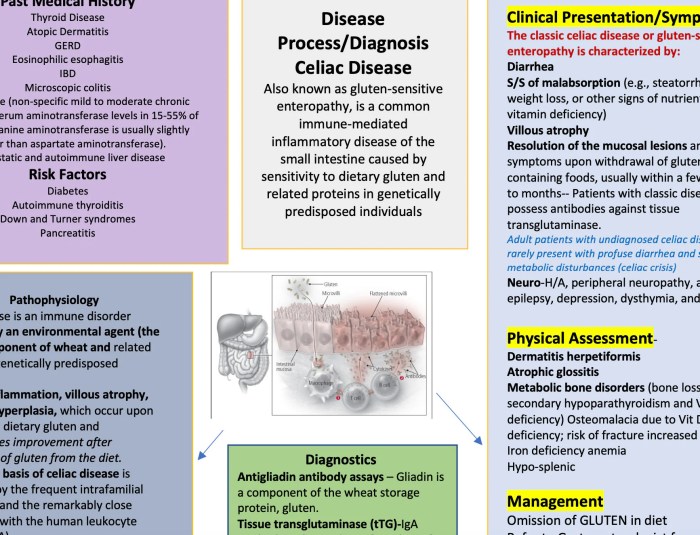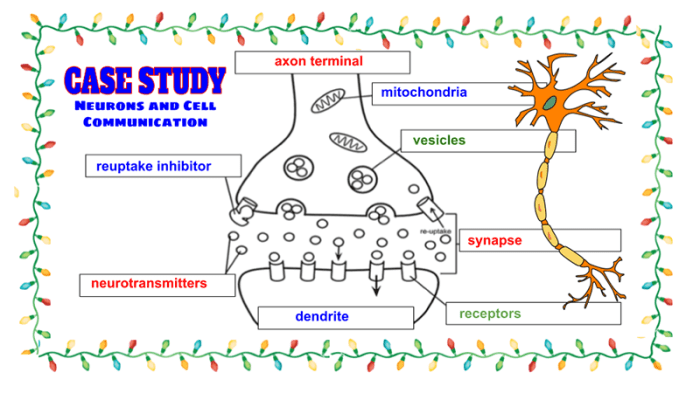Embarking on a journey into the depths of celiac disease, this case study unveils the hidden truths behind its enigmatic nature. Case study celiac disease answers unravels the complexities of this autoimmune condition, empowering individuals to reclaim their health and well-being.
Celiac disease, a prevalent and often misdiagnosed condition, affects millions worldwide. Its insidious symptoms and long-term health implications demand a comprehensive understanding to ensure timely diagnosis and effective management.
Introduction: Case Study Celiac Disease Answers

Celiac disease is an autoimmune disorder that affects the small intestine. It is triggered by the ingestion of gluten, a protein found in wheat, rye, and barley. Celiac disease causes inflammation and damage to the small intestine, which can lead to a variety of health problems.
Celiac disease is a common condition, affecting about 1% of the population. It is more common in women than men, and it often develops in childhood. However, it can also develop in adults at any age.
The symptoms of celiac disease can vary from person to person. Some people with celiac disease have no symptoms, while others may experience a variety of digestive problems, such as diarrhea, constipation, bloating, and gas. Other symptoms of celiac disease can include fatigue, weight loss, anemia, and skin rashes.
Celiac disease is diagnosed through a blood test and a biopsy of the small intestine. Treatment for celiac disease involves following a gluten-free diet. A gluten-free diet is a diet that does not contain any gluten. This means avoiding all foods that contain wheat, rye, and barley.
Treatment and Management

Gluten-Free Diet
The gluten-free diet is the only effective treatment for celiac disease. A gluten-free diet involves avoiding all foods that contain gluten. This means avoiding all foods that contain wheat, rye, and barley. There are many gluten-free foods available, including fruits, vegetables, meat, fish, and rice.
There are also many gluten-free products available, such as bread, pasta, and cereal.
Tips for Adhering to a Gluten-Free Diet, Case study celiac disease answers
Following a gluten-free diet can be challenging, but it is important to stick to the diet in order to manage celiac disease. Here are some tips for adhering to a gluten-free diet:
- Read food labels carefully. Many foods that are not labeled gluten-free may contain hidden gluten.
- Be aware of cross-contamination. Gluten can be transferred from gluten-containing foods to gluten-free foods through contact with shared utensils, surfaces, or cooking equipment.
- Eat out carefully. Many restaurants do not understand celiac disease and may not be able to provide gluten-free meals.
- Talk to a registered dietitian. A registered dietitian can help you create a gluten-free meal plan and provide you with support.
Role of Medication in Treating Celiac Disease
There is no medication that can cure celiac disease. However, there are medications that can help to relieve the symptoms of celiac disease. These medications include:
- Corticosteroids. Corticosteroids can help to reduce inflammation in the small intestine.
- Immunosuppressants. Immunosuppressants can help to suppress the immune system and reduce inflammation.
Long-Term Effects
Potential Long-Term Health Effects of Untreated Celiac Disease
Untreated celiac disease can lead to a variety of long-term health problems, including:
- Malnutrition. Celiac disease can damage the small intestine and interfere with the absorption of nutrients. This can lead to malnutrition and weight loss.
- Osteoporosis. Celiac disease can interfere with the absorption of calcium and vitamin D. This can lead to osteoporosis, a condition that makes bones weak and brittle.
- Infertility. Celiac disease can damage the reproductive organs and lead to infertility.
- Cancer. Celiac disease is associated with an increased risk of certain types of cancer, such as lymphoma and intestinal cancer.
Importance of Early Diagnosis and Treatment
Early diagnosis and treatment of celiac disease is important to prevent these long-term health problems. If you think you may have celiac disease, talk to your doctor.
Complications Associated with Celiac Disease
In addition to the long-term health problems listed above, celiac disease can also lead to a number of complications, such as:
- Lactose intolerance. Celiac disease can damage the small intestine and make it difficult to digest lactose, the sugar found in milk and other dairy products.
- Iron deficiency anemia. Celiac disease can interfere with the absorption of iron. This can lead to iron deficiency anemia, a condition that causes fatigue and weakness.
- Dermatitis herpetiformis. Dermatitis herpetiformis is a skin rash that is associated with celiac disease.
Case Studies
Case Study 1
A 25-year-old woman presented with a history of chronic diarrhea, weight loss, and fatigue. She had been diagnosed with irritable bowel syndrome (IBS) and had been treated with a variety of medications, but her symptoms had not improved. A blood test revealed that she had celiac disease.
She was started on a gluten-free diet and her symptoms resolved within a few weeks.
Case Study 2
A 10-year-old boy presented with a history of abdominal pain, bloating, and constipation. He had been diagnosed with celiac disease two years earlier and had been following a gluten-free diet. However, he had recently started to experience symptoms again. A blood test revealed that he was still consuming gluten.
He was counseled on the importance of adhering to a gluten-free diet and his symptoms resolved within a few weeks.
Clarifying Questions
What is celiac disease?
Celiac disease is an autoimmune disorder triggered by the ingestion of gluten, a protein found in wheat, rye, and barley. It damages the small intestine, impairing its ability to absorb nutrients.
What are the symptoms of celiac disease?
Symptoms vary widely and may include digestive issues (diarrhea, constipation, bloating), fatigue, weight loss, anemia, skin rashes, and neurological problems.
How is celiac disease diagnosed?
Diagnosis involves blood tests to detect antibodies and genetic markers, as well as a biopsy of the small intestine to confirm the presence of damage.
What is the treatment for celiac disease?
The primary treatment is a strict lifelong gluten-free diet. Medications may be prescribed to manage symptoms and prevent complications.
What are the long-term effects of untreated celiac disease?
Untreated celiac disease can lead to serious health complications, including malnutrition, osteoporosis, infertility, and an increased risk of certain cancers.